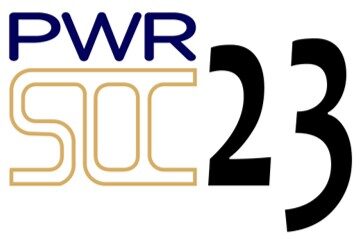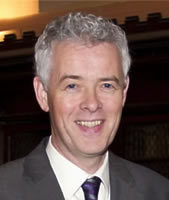 Session Chair: Cian O’Mathuna
Session Chair: Cian O’Mathuna
Prof. Ó Mathúna has more than 30 years’ experience in applied research, R&D program definition, management and technology transfer to Irish and international industry and is the Head of the Microsystems Centre at Tyndall National Institute in Cork, Ireland’s leading ICT institute, which is focused on developing a fundamental understanding of how to interface microelectronics with:
- The built and the natural environment to improve the sustainability of our natural resources and the quality of our environment through monitoring and control
- The human body to enhance our health and well-being through diagnostics and therapeutics.
His research and publications have focused on the convergence of microelectronics and microsystems whereby CMOS provides an intelligent platform for the miniaturization and functional integration of non-standard functions such as sensors, actuators, power and cooling.
Prof. Ó Mathúna has been a co-founding member of national industry-academic research clusters in the areas of surface mount technology (Smart Group Ireland), wireless sensor networks (WiSEN) and power electronics (PEIG). In 2010, he was an Irish Government appointee on the National Innovation Task Force Implementation Group. He is a Research Professor in the Department of Electrical and Electronic Engineering, University College Cork. In 2008, he founded the International Workshop on Power Supply on Chip (PwrSoC) which is now the PSMA/IEEE flagship conference in this space. In January 2013, he was named an IEEE Fellow in the field of power electronics “for leadership in the development of power supply using micro magnetics on silicon”.
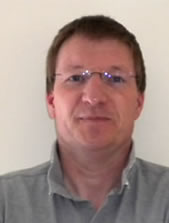 Bruno Allard
Bruno Allard
Bruno ALLARD received the M.Sc. and Ph.D. degrees in engineering from the Institut National des Sciences Appliques de Lyon (INSA Lyon), Lyon, France, in 1989 and 1992, respectively. He has led numerous industrial and academic projects. He is the author or coauthor of more than 80 papers in Transactions and Journals and 100 international conference contributions. His research interests include the integration of power systems, either hybrid or monolithic, in the frame of low-power monolithic converter design.
“State of the art of high switching frequency inductive DC-DC converters in SoC context”
Supplying large system on chip requires specific grid and is spread over multiple voltage domains. Each domain depends on a dedicated DC-DC. For the sake of integration, switch capacitor DC-DC seems to have the favors of designers but further increase in the switching frequency associated to a 3D approach gives back some competitiveness to inductive DC-DC converters.
Some recent experiments in the +100 MHz switching frequency area demonstrate the interest of multiphase and coupled inductors. A global analysis of pertinent results as state of the art enables to draw similar conclusions and many other trends.
Various landscapes have been populated with available figures in pertinent papers about implemented DC-DC converters. Trends are analyzed to exhibit design trade-offs and further extrapolations, focusing mainly on active devices.
In the context of POWERSWIPE project, a 200 MHz DC-DC converter (3.3 V input voltage, 350 mW output power, 1.2 V to 0.6 V output voltage) is taken as a study case. Specifications are added in the landscape and the trend analysis orientates the converter architecture for 40 nm CMOS technology. Particularly, cascode-based power stage is analyzed and selected. Primary post-layout simulation results let hope more than 90% power efficiency. Passive devices are related to an interposer technology targeting the fabrication of magnetic devices on top of embedded capacitor banks.
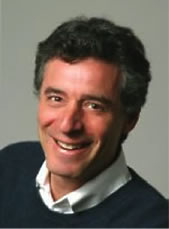 Seth Sanders
Seth Sanders
Seth R. Sanders is a Professor of Electrical Engineering in the Department of Electrical Engineering and Computer Sciences at the University of California, Berkeley. He received S.B. degrees (1981) in Electrical Engineering and Physics, and the S.M. (1985) and Ph.D. (1989) degrees in Electrical Engineering from the Massachusetts Institute of Technology, Cambridge. Following an early experience as a Design Engineer at the Honeywell Test Instruments Division in 1981-83, and his graduate studies, he joined the UC Berkeley faculty in 1989. His research interests are in high-frequency power conversion circuits and components, in design and control of electric machine systems, and in nonlinear circuit and system theory as related to the power electronics field. Dr. Sanders is presently serving or has recently been active in supervising research projects in the areas of flywheel energy storage, novel electric machine design, renewable energy systems, and digital pulse-width modulation strategies and associated IC designs for power conversion applications. Since 2013, he has been serving as CTO of Amber Kinetics Inc., an innovator and manufacturer of grid scale flywheel energy storage systems. During the 1992-1993 academic year, he was on industrial leave with National Semiconductor, Santa Clara, CA. Dr. Sanders received the NSF Young Investigator Award in 1993 and multiple Best Paper Awards from the IEEE Power Electronics and the IEEE Industry Applications Societies. He has served as Chair of the IEEE PELS Technical Committee on Computers in Power Electronics, as Chair of the IEEE PELS Technical Committee on Power Electronic Systems and Components, and as a Member-At-Large of the IEEE PELS Adcomm. He is an IEEE Fellow, and a Distinguished Lecturer of IEEE PELS.
“The Road to Integrated Power Conversion via the Switched Capacitor Approach”
Technical merits and challenges of the switched capacitor (SC) approach to fully integrated on-chip dc-dc power conversion are discussed. Since switched capacitor converters contain no magnetic devices, they are well suited to integration in a range of CMOS processes. Switched capacitor converters do present a number of challenges in passive implementation and utilization, in voltage regulation, and in ripple performance. Design strategies to meet these challenges are outlined. The last few years have seen acceleration in the design and application of high performance on-die SC converters, and this talk will summarize the progress.
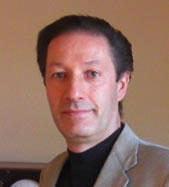 Francesco Carobolante
Francesco Carobolante
Francesco Carobolante is Vice President of Engineering at Qualcomm Incorporated. In this position, he has been responsible for the development of products and technologies for mixed signal Integrated Circuits (primarily in Power Management and analog subsystems). He is currently leading the development of Wireless Power Transfer technology and its standardization through A4WP (the Alliance for Wireless Power). Prior to joining Qualcomm, he held positions at STMicroelectronics, Tripath Technology and Fairchild Semiconductors, developing analog, power, and MEMS based mixed signal products. He holds more than 50 patents and has published several papers on power, mixed signal and system design. He received an Electrical Engineering and PE degrees from the University of Padova in Italy, and a MSEE from UCLA.
“Power Supply on Chip: from R&D to commercial products”
Many technologies, which are required to enable the development of Power Supplies on Chip, continue to evolve at a rapid pace, showing promising results: where are we in our quest for manufacturable solutions?
Some applications today can take advantage of existing features developed for deep submicron processors including high value on die capacitors for charge pumps and switch capacitors apps. Generally speaking however, they only address narrow market niches including energy harvesting and low current applications. The demand for mainstream power supply on a chip will require integrated inductors for higher power applications, which add manufacturing cost, particularly at low volume. Including an exotic process on mainstream processors will require very low cost and the benefit must be obvious to the consumer (battery life/ more features, lower cost).
Progress has been made and this workshop will demonstrate we have continued to make evolutionary gains towards realizing power supplies on a chip. Products have been introduced which have advanced the deployment of power supplies on chip – fine-grain power delivery using LDOs (IBM), SMPS (Intel/in package inductors) – with many other industry leaders likely to follow in this trend.
We will review the state of the art in the power management technologies that can deliver commercially viable solutions and highlight the next steps required to make power supplies on chip pervasive in different application spaces that benefit from such integration.
